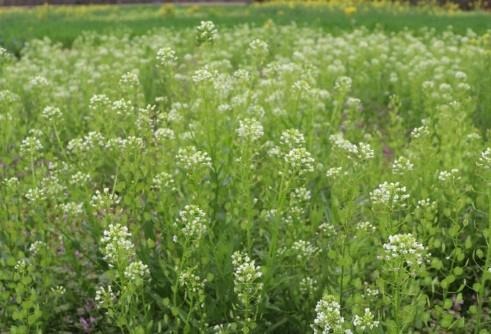As U.S. agricultural systems continue to feel economic and ecological strain, a team of researchers at the University of Tennessee Institute of Agriculture is looking at the value of winter oilseed crops as biofuels. The project, which began in 2019, has recently been awarded a $800,000 grant from Shell PLC to continue the work through 2025.
The project, “Novel Oil Crop Benchmarking for the Mid-South and Southeastern United States,” takes a closer look at how oilseed crops, such as pennycress, camelina, carinata and flax, can be integrated into farming practices in ways that complement food crop production and improve agricultural sustainability. Virginia Sykes, an assistant professor in the Department of Plant Sciences, is the project director. Sykes and Professor Frank Yin, also from the Department of Plant Sciences, are focusing on the agronomic portion of the project. Chris Boyer and Edward Yu, professors in the Department of Agricultural and Resource Economics, are analyzing the relationship between input uses and crop outputs.
“This project provides a great opportunity to expand on our work identifying novel crops for the Mid-South and Southeast,” says Sykes. “The state of Tennessee is unique in that it represents a broad range of physiographic regions, making it an ideal location to screen potential crops. Our goal is to identify a win-win for sustainability by finding crops that can increase environmental sustainability, in both our agricultural systems and through the production of biofuels, while adding economic value to our producers.”

Oilseed crops such as pennycress can be integrated into farming practices in ways that complement food crop production and improve agricultural sustainability.
Until recently, research into various winter oilseed crops for economic and agricultural benefits has been limited and largely isolated to the Midwest. By conducting research on oilseed crops in Tennessee, the team is uniquely suited to expand the research across three different physiographic regions, which represent the broader Mid-south and Southeastern regions of the U.S. The locations for the study are UT’s East Tennessee, Highland Rim, Milan and West Tennessee AgResearch and Education Centers.
A versatile crop, winter oilseeds can be grown as double crop in Tennessee. As a winter crop, they can be utilized in human, animal and industrial consumption without competing with most major food crops, which are primarily grown in the summer. These crops can also provide many of the same benefits as a winter cover crop, such as reducing erosion and nutrient runoff.
Sykes and Yin, along with now retired professors James Larson and Burt English, from the Department of Agricultural and Resource Economics, started this project with small plot trials of different oilseed varieties in 2019 at the Highland Rim and Milan AgResearch and Education Centers. With the grant from Shell, they will continue the trials through 2025, expanding the scope of species and varieties evaluated, and perform additional studies to evaluate best agronomic management practices, such as seeding and nitrogen rate. The oilseed varieties being researched are compared for yield, oil content and quality, and impact on succeeding soybean crop yield and quality and impact on soil parameters. The objectives of the project are to identify top winter oilseed crops for the three physiographic regions, determine best management practices to maximize outputs, and to deliver an economic analysis and valuation of co-products.
Source : tennessee.edu